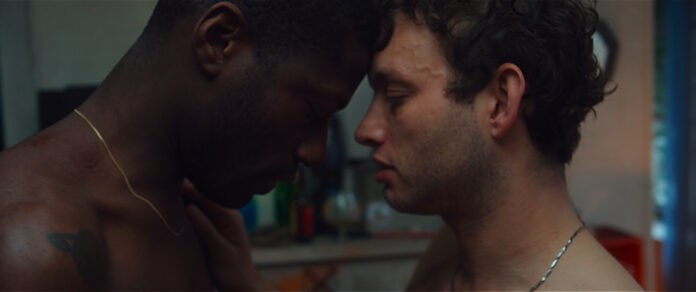The engrossing queer film, “Eat the Night” mixes gay romance, video games and drug warfare into a visually and emotionally stimulating drama.
The film, co-directed by Caroline Poggi and Jonathan Vinel, opens with the teenage Appoline (Lila Gueneau) being devastated when it is announced that Darknoon, the video game that “is more home than home” for her, is going to be shut down forever. Appoline plays the game with her gay older brother, Pablo (Théo Cholbi), who makes and deals drugs. Their avatars allow them to live as they want to in a world they can control. Their parents are largely absent, and the game provides a good escape from their dead-end lives.
When Pablo is beaten up by the members of a rival drug gang, headed by Louis (Mathieu Perotto), a man named Night (Erwan Kepoa Falé) comes to his aid. Pablo is smitten with Night and asks his new friend to quit his job and be his partner. Night agrees, and the couple bond during a scene where Pablo teaches Night how to make pills. Soon the guys become passionate lovers.
As “Eat the Night” counts down to the final moments of Darknoon, the characters experience several reversals of fortune. Appoline is angry her brother is not playing online and is jealous of his boyfriend. Pablo exacts revenge on a gang member who beat him up, escalating an increasingly more violent turf war with Louis. And when Pablo is sent to prison, Night starts to play Darknoon, creating an avatar to keep an eye on Appoline (per Pablo’s request) while also figuring out how to get revenge on Louis.
How things play out will keep viewers intrigued, but it is the worldbuilding that is most impressive. Directors Caroline Poggi and Jonathan Vinel designed the game Darknoon specifically for the film, using its dynamic visual world to mirror the characters, explore their emotions, and craft parallels and alternate realities. The film spends considerable time in the virtual world to enable Appoline to express her emotions about her world “ending,” her love for her brother — who promises to be with her on the last day of the game — and for Night to secretly connect with and befriend her.
The real-world scenes are equally strong and meaningful. “Eat the Night” is, at its heart, a tender love story. The siblings’ love for each other is quite strong, and the relationship between Pablo and Night is depicted with considerable affection. The film does not shy away from some pretty erotic love scenes between the guys, and their sexuality is never an issue. (Though Appoline does feel resentful when she spies Pablo and Night in an act of intimacy). Both Pablo and Night go to some extremes to care for each other when they are separated. It is quite poignant, and Cholbi and Falé make a cute couple. The actors, who both appeared in the gay drama, “Passages,” have a terrific rapport.
Alas, the escalating drug warfare storyline feels the most cliché, but it does provide the film with its narrative momentum. The actions and reactions between Pablo and Night and Louis and his crew build tension that may be predictable but can also hit viewers like a taser. However, these scenes magnify how tragic and senseless gang violence is. The filmmakers get this point across, but they avoid addressing the negative impact of the drug culture. Moreover, Night seems unconcerned regarding the risks of working with Pablo, and Pablo’s rash actions against his rivals put everyone he loves in danger. It is frustrating to watch, but the filmmakers do make the action absorbing.
The actors all give compelling performances. Théo Cholbi excels as the hotheaded Pablo, who can be caring one minute and brutal the next. He can be charming with his sister or threatening when he confronts a rival, but he is best when he and Night are together. As Night, Erwan Kepoa Falé carries himself with magnetic sensitivity and confidence. Watching him break into Louis’ house and size up two dicey situations reveals much about his character, as do his exchanges with Pablo and Appoline. In support, Lila Gueneau is deliberately more emotive in her avatar role than in real life, which engenders sympathy for her character who feels lost in the real world.
“Eat the Night” has some interesting points to make about how its characters find their place in the world as it comes crashing down on them. This captivating film is screening one time only in Philadelphia — Jan. 10 at 7:30 p.m. at PhilaMOCA, 531 N 12th St. Try not to miss it.

